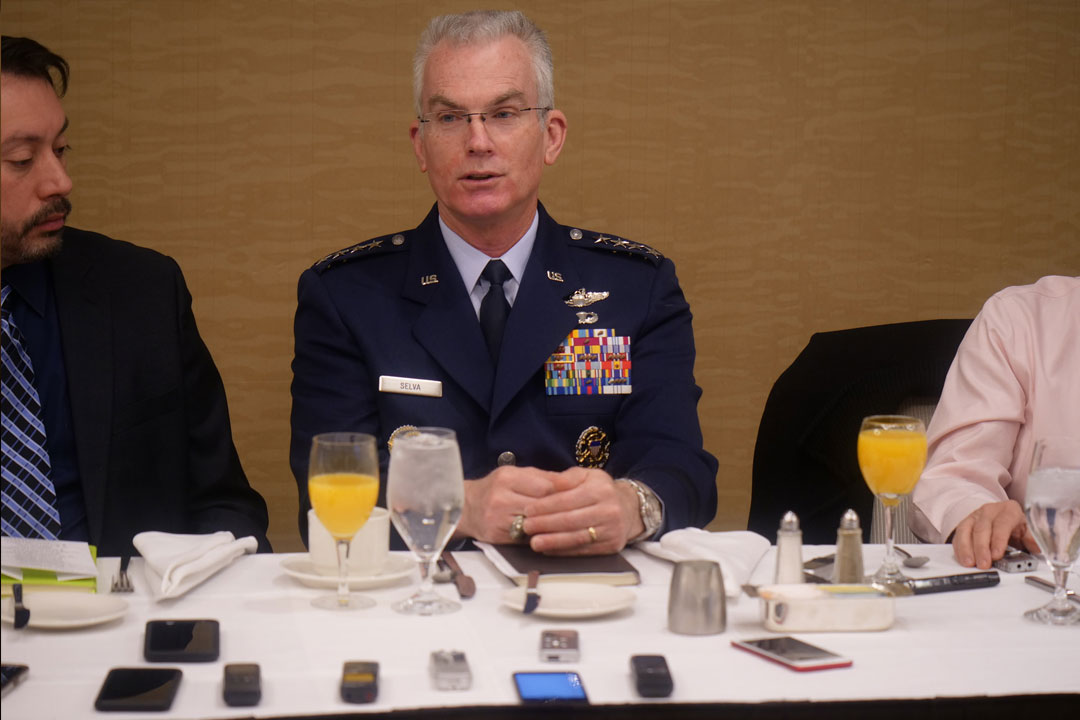By David Ensor
Director of the Project for Media and National Security and Walter R. Roberts Fellow
It is not every day that a group of journalists can participate in an hour-long conversation with the nation’s second highest-ranking military officer.
On Jan. 30, over 30 reporters from the Defense Writers Group’s member organizations sat down with Air Force Gen. Paul J. Selva, vice chairman of the Joint Chiefs of Staff.
The conversation resulted in over twenty articles published by media ranging from The Washington Post, The New York Times and Reuters to specialized trade publications including Stars and Stripes, Defense News and Military.com. Foreign outlets, including Britain’s Daily Telegraph and Russia’s Tass newswire, also joined the conversation.
The Defense Writers Group is part of the George Washington University’s Project for Media and National Security, housed at the School of Media and Public Affairs (SMPA). Selva was the highest-ranking military official to speak to the group in over five years.
Selva told reporters that the Pentagon is in the opening stages of “redesigning the force” to be able to combat Russia and China in an era when great power competition is returning as a top priority after a focus on combatting global terrorism.
The new National Defense Strategy will address which capabilities will be needed to take on either fight. “There are two unique competitions that we have to deal with,” Selva said, requiring different military forces and weapons. Then, there is terrorism, and the lesser, but still serious, challenges of North Korea and Iran.
The Pentagon’s task now, Selva said, is to devise a strategy within the budget they are given that will cover all these risks.
Given budgetary limits, “We can either appropriate the funds to get those tasks done, or we can articulate the risk,” Selva said.
On North Korea, Selva told reporters that the U.S. would likely only have a warning time of a “dozen minutes or so” if Pyongyang launched a missile in its direction.
He said the North Koreans have cut the warning time down from as much as an hour by deploying new mobile launch trucks. However, Selva said North Korean leader Kim John Un is still unable to reliably strike targets in the U.S. with an intercontinental missile since the necessary technology has not been fully tested.
The lead story from the breakfast meeting for The Washington Times and The Daily Telegraph (UK) was the likelihood that ISIS will continue to inspire home-grown terrorists for years after it is defeated on the battlefield.
A new headache for the U.S. and its allies is what to do with hundreds of foreign fighters, ISIS detainees and their families now that the terror group has been driven from most of the territory it held.
One key issue Selva raised that did not get attention from the press is how to diminish the risk that a new international terrorist will emerge in a few years.
“My concern is in five or 10 years we’ll have ISIS 2.0 or al-Qaida 3.0 and the process will start again somewhere else in the world,” Selva said.
“The question is, does every partner nation in the coalition have a similar effort to try to wring out of the internet and the education system and our employment practices — the kinds of things that were the breeding ground for foreign fighters in the first place?”
“A kid from London doesn’t just get up in the morning and say ‘You know what? I think I’ll go to Syria and kill people for a few years.’ Something happens that causes that person to be predisposed to that activity.”
Dealing with this massive issue is not just the job of soldiers. Selva was blunt, “I kill people and break things. I don’t build schools and teach children the right way to treat one another. But somebody in government needs to be paying attention to that part.”
It is a task for State Department diplomats, public diplomacy officers, sociologists and psychiatrists — not for the Pentagon, he said.


